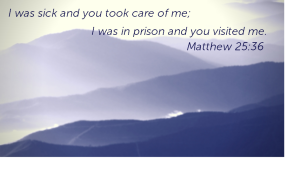Last Sunday, we published Eucharistic Ministry, a class on the ministry of administering the Eucharist to those who cannot attend church services. In the class, Deacon Tim Spannaus discusses the pastoral nature of the Eucharistic visit, pointing out that in addition to administering Holy Communion, the Eucharistic visitor should also observe the well-being of the care recipient so as to be able to report back to the parish about the person’s pastoral care needs. One person to whom the Eucharistic visitor might report this information might be the care recipient’s Stephen Minister.
Stephen Ministry programs link people who are going through painful life transitions with lay people who have been trained to offer them effective pastoral care. Often, the Stephen Minister assists people who are limited due to age or illness and require pastoral visits in their homes, but Stephen Ministers care for people who face many other kinds of pain as well: people who grieve the loss of loved ones, who face divorce or unemployment — people who deal with any kinds of life crisis may call for the help of a Stephen Minister. At least once a week, the Stephen Minister will meet with the care recipient for approximately one hour. He or she will offer compassionate, confidential listening, care that does not diminish over time, and other services, based on the needs of the care recipient. Stephen Ministers train for 50 hours with Stephen Leaders (who themselves have undergone rigorous training) before they begin active ministry. Usually, Stephen Ministers work with only one care recipient at a time so that each of them can focus full attention on the care recipient’s needs.
Named for St. Stephen, the first layperson commissioned by the followers of Jesus to care for those in need, Stephen Ministry programs are widespread. Over 12,000 congregations in many Christian denominations in every U.S. state and in 29 countries across the world use the Stephen Ministry program. The program was started in 1975 by the Rev. Kenneth Haugk, a priest who used his background in psychotherapy to train laypeople in his congregation to assist with pastoral care. The program developed until now, forty years later, over 600,000 people have trained as Stephen Ministers, caring for over one and half million care recipients.
My great aunt, when she was homebound, called upon the Stephen Ministers at her congregation for assistance, and the work that her Stephen Minister did with her meant a great deal to her. The Stephen Minister offered practical assistance, but it was the sense of connection with her congregation that mattered the most to my aunt. I can only imagine the isolation that she experienced, transitioning from the cheerful, active member of her church’s congregation she had been for most of her adult life to a homebound person who could barely leave her room. The most important work that my aunt’s Stephen Minister did for her was offer her a connection with her congregation. She had not been abandoned by the church in her old age; instead, through her Stephen Minister (and others), the church offered her the care that at the most fundamental level churches exist to offer their congregants. As we treat one another, we treat Christ. What better way is there to offer God worship than to offer God’s care to the people who most need help?

